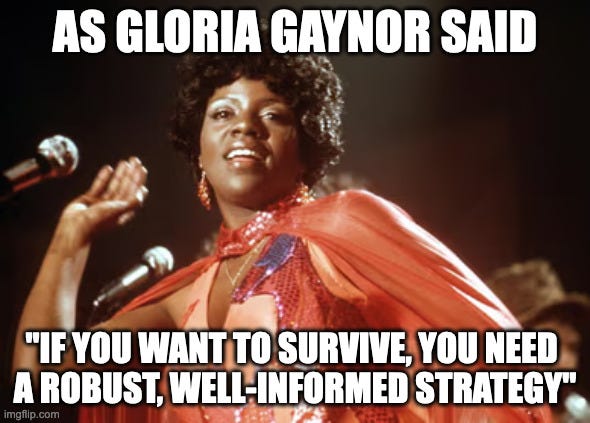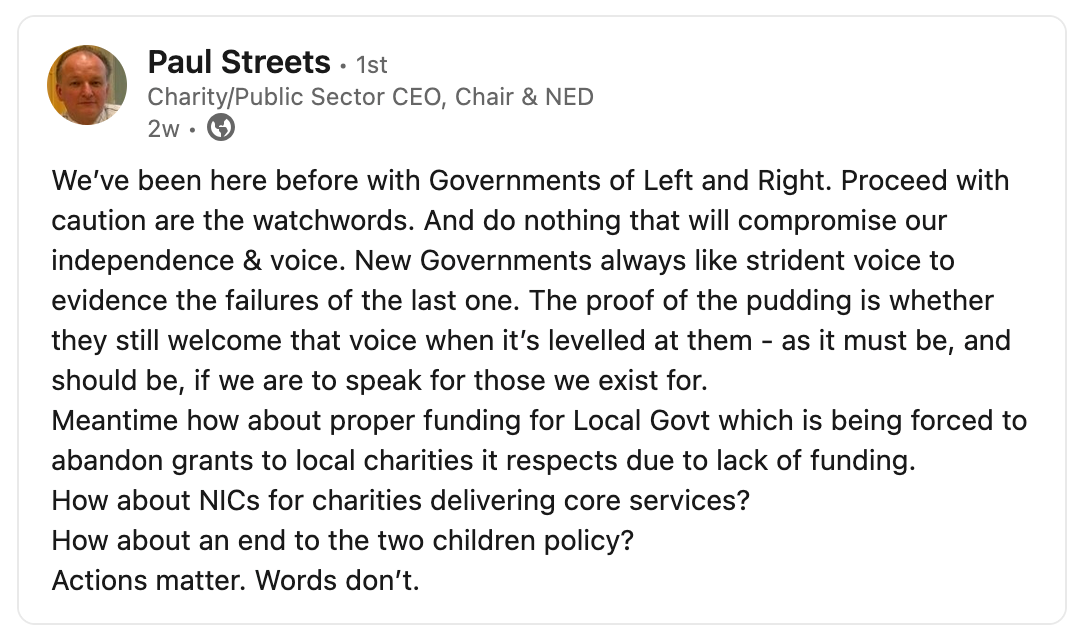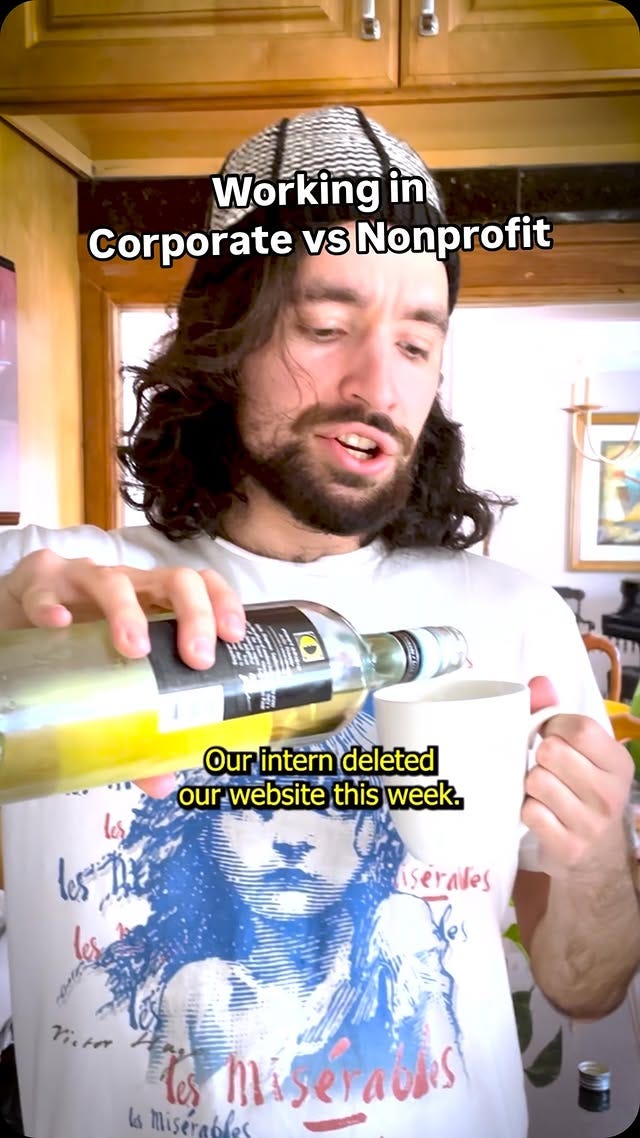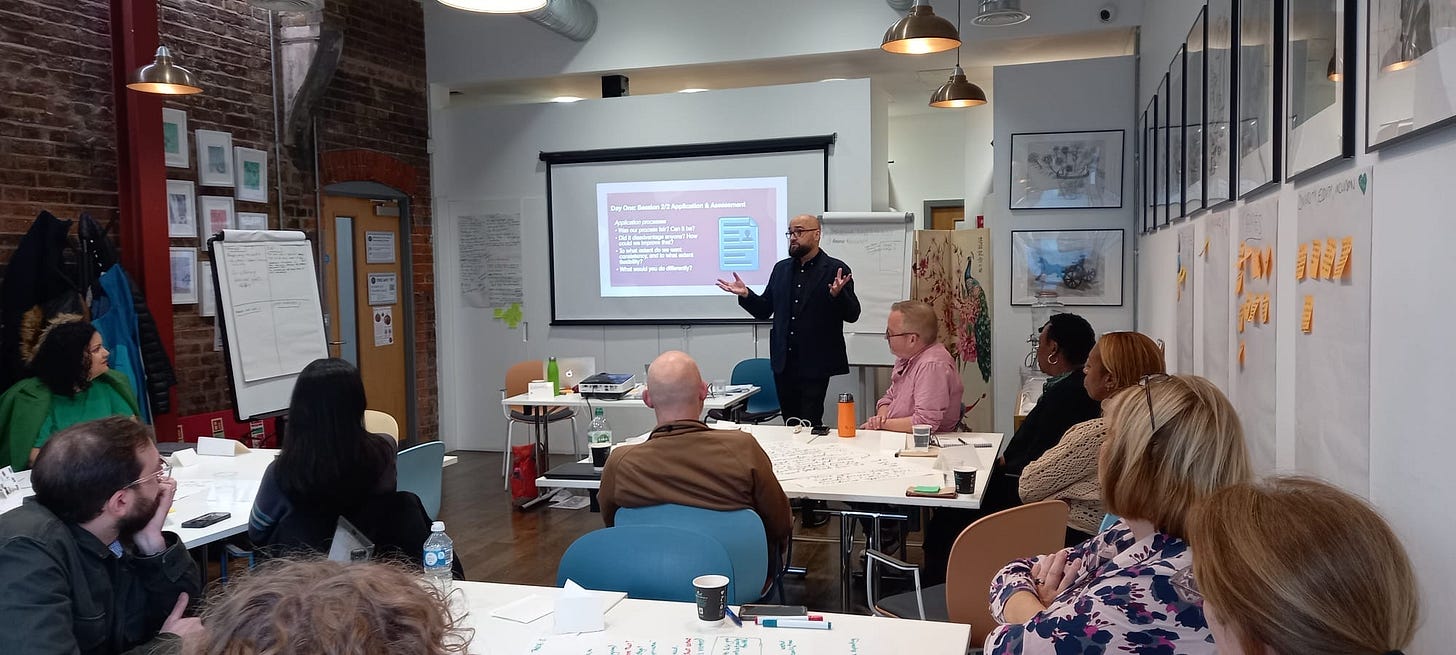A Nonprofit New Year: this is what to expect in 2025....
What's on the cards for the VCS? Strategy drivers ahoy in the Barely Civil Society crystal ball...
The funny personal bit
Well. How was your break? Mine was good, even though I hate Christmas - the noise of it, smell of it, the smug people jumping up and down wrapped in tinsel. The only time I’ve ever found tinsel amusing was when I once saw a piece of it sticking out of my childhood cat’s anus. Oh, how we laughed, and then pulled. Hilarious, albeit not for the cat, and potentially expensive given what I know now about vet’s bills. Anyway.*
Still, I had a good break and only thought about the voluntary sector a few times a day, mostly at 3am and when I hadn’t drunk enough.
Having lowered the tone at the outset, now we get on to the fairly serious business of civil society in 2025.
*Before you email me, he was fine.
The Serious Stuff: What to expect in 2025
We all know last year was a bit of a nightmare. We should feel real solidarity with those who lost jobs or are struggling to find support. But as Gloria Gaynor once said, if you want to survive, it’s important to have a robust, well-informed strategy. (That was on the 12”.) And look, some things will undoubtedly get better. But, as they had it on the New Statesman podcast, this year is radically unpredictable. Here are some possibilities, probabilities, and speculations.
Public Sector
So, if you haven’t noticed local authorities are in trouble, you need to get out more. (Or possibly you get out too much, maybe even having fun, in which case, stop it.) Some charities, however, have remained extensively supported by them, even while they see other councils go into extreme austerity or financial shutdown. Some have undoubtedly developed a false sense of security, not least since LAs have been crying poverty as long as charities have. What’s changed?
Well, this may be the year that a lot more local authorities (don’t quite) go bankrupt. (As we know, in theory, they can’t - but in reality, if they run out of dosh, they will be taken back into Government control in what is called a section 114 notice). Now, to my mind, it all depends on whether the Goverment forces them to actually produce real accounts. 90% of them haven’t. This is a hidden problem which many will want to remain hidden. Not least, the Treasury really doesn’t need umpteen Councils to bail out. So keep an eye out for more Section 114s, but also be aware of just how hard they may be working to avoid it - with a very large pair of scissors.
Some charities have diversified income across many local authorities, and of course, it’s always wise not to put all your eggs in one basket. Putting your eggs in many baskets, when every basket has holes and is about to be transported on a penny farthing over cobblestones (downhill in a thunderstorm), is less wise.
NHS: What next?
NHS money for the few charities who can access it (one of my clients unlocked a six-figure sum for work they care about – I’m proud of them!) is likely to be safer. But again, always predicated on an understanding of holistic care that few commissioners and health policy makers are empowered to make real.
The NHS changes Starmer and Streeting are proposing are pretty much Blair playbook stuff, without the same level of investment and ambition. More private sector involvement: well, you can imagine what I think about that. Starmer claims he is above ideology. But as co-chair of Keep Our NHS Public, Dr Tony O’Sullivan, put it in the Guardian, “The private sector needs NHS funding to be diverted and NHS staff to reduce their NHS hours to staff ‘spare capacity’. Feeding the parasite undermines the health of the NHS host.” And note: the DHSC has made it clear that these new private sector contracts are precisely designed to be done at scale, and long term. This is not the temporary quick fix Starmer is claiming. As for the wider picture: a condition of any trade deal with the US will be opening up the health service to American private healthcare providers - this is widely discussed and on record. So this is not an encouraging development. Unless, let’s be honest, you need a hip replacement fast.
Now, whether there is a role for charities in the NHS, over the years I’ve become more and more sceptical. In some ways, the NHS at its best is fundamentally ill-equipped to deal with the VCS at its best. For good reasons, the NHS is industrialised healthcare run at scale in rigorous and inflexible frameworks (albeit often very badly). For equally good reasons, the VCS isn’t (although it too is often run badly). Interfacing the two is incredibly challenging, even if we have seen that such interfaces have been a game changer in many places.
Promises to prioritise social prescribing in The Long-Term Plan were very much a way of avoiding expenditure, not directing investment. At the end of the day, I would expect NHS contributions to the VCS largely to remain a long procession of social precrib-ees at your door with a note pinned to their jumper saying ‘fix me’, and asking you to pay for their taxi fare.
The below is interesting. Richard J Murphy is pretty trenchant and not going to make many friends. But it’s hard to disagree with the meat of what he says, not just on Wes Streeting, but the fact that Labour just seems to be without any thinkers. It reminds of of Mariana Mazzucato’s book ‘The Big Con’ where she argues that an over-reliance on outsourcing thinking to consultants has left the public sector without the skills and ideas needed to govern. Still freaked out that Richard looks like me Dad with blond hair.
Alien: Civil Society Covenant
And then the talk of the town. The civil society covenant - what difference will it make? Let’s be clear, I do think it’s important, and truly respect the hard work that NCVO and ACEVO are doing. But of course, many in delivery charities are asking… well, what will that do?
As usual, I liked what Paul Streets said about the covenant - ‘Actions matter. Words don’t.’ Of course words do matter, and the vicious rhetoric of the last Government did a huge amount of damage to both charities and the people we support. But they’re not enough alone.
Beyond that, will government ‘consulting’ us before they make decisions on policy just be an excuse to get us doing more for less? Yes.
And are they just cosying up to philanthropists because they want them to take on the burden of supporting society in a shrinking state? Also yes. Glad we cleared that up.
A new local philanthropy/ place-based giving strategy is another Government ambition, which is aiming to get money out of corporates and the rich into communities. Of course local authorities may be leading that…. hmmmm…. But hey, it has worked in some places where there actually is money to be had.
I do think that we should expect some funding ‘pots’ for particular social areas - community ‘resilience’, youth stuff, and more. But those will be flashy and splashy and not very large. I would expect more of it to go through local and possibly regional channels. Make sure you know what those are and keep an eye out.
Grantmaking
Children and families work is getting a boost with the National Lottery’s new portfolio. I’m also seeing expected growth in work around asylum and migration support, and youth work is about to become a focus across multiple funders’ strategies at both local and national level. About time too. That dovetails nicely into the major rethink of youth policy and the development of a new youth strategy by the Government.
Older People’s charities are likely to meet some bumps in the road if they rely on trusts and foundations, and I can see multiple funders moving out of the space as the focus shifts to the young - exactly the opposite shift we saw when the ConDem Government got in 15 years ago. We can hope that some of this cash does something to remediate the execrable state of youth work.
I fear that, despite Government talk about ‘community resilience’ in the light of the riots and so on, community work and anything complex or cross-cutting is unlikely to thrive, particularly because of the growth of targeting and what is called ‘strategic grantmaking’. This is where grantmakers focus their grants almost in the same way that commissioners do, rather than relying on a more ‘reactive’, or, I would say, ‘responsive’ approach where they let the ‘market’ (or sector itself) decide. There are issues and benefits with both approaches, but it certainly seems to be that strategic grantmaking is taking the upper hand. (Often this is said to be driven by a belief in following ‘what works’, but often it is equally led by a desire for private sector trustees to see big-number-go-up-on-spreadsheet-whoosh, and an overly simplistic view of the diversity and validity of social science approaches.)
For charities who work with complex areas of need, or even, gasp, across more than one type of need or person, carving up services into specific groups and cohorts is likely to be more important than ever. Work which foregrounds and invests in communities of colour will continue to be a priority for grantmakers, and especially, in theory, for smaller grassroots organisations who had in the past been considered too ‘risky’ to fund.
Grantmakers will remain overwhelmed with new applications, especially since their closures will have stored up demand from those who survived it. Expect to find some of the funders you have previously relied on no longer supporting your work; however, you will no doubt find others have come into your headlights. They will be starting to double down with a newfound confidence in a need to make ‘tough decisions’ - they too face a failing system, a tanked economy, and problems that cannot be solved. There’s not much alternative.
In terms of the kind of money, I’ve seen more talk across funders than ever about unrestricted and core funding, which may, who knows, be real this time. It may be that larger grants go to fewer people, and unrestricted funding, for longer periods, is the goal. Then again, how many times have we heard this? Bear in mind that those of you who have been arguing for years for fewer, larger grants for longer periods may find yourselves on the wrong end of the policy…
I’m hearing more about direct approaches/ invitation only grantmaking, now that they have been overwhelmed. That is probably good news for the national and well-known, and bad news for the local and little-known. Maybe now it really will be of benefit to have those trustees with connections after all.
That also raises the question: given the much lower return on investment, will charities choose to invest in business development and fundraising or cut their losses (or indeed, just costs)? I’ve seen both. It’s not a good time to ditch talented strategic fundraisers who can make a real compelling ask. (Of whom, btw, there are not that many….) However, in times like these, slow and steady wins the race. Of course the problem with the old business adage that you should never let your sales team go when business is bad only works if you actually have a choice about what to spend your cash on. And guess what…
Okay, now solve poverty
In terms of service delivery, that notion of ever-increasing cross-cutting ‘need’ that we talk about is unlikely to go away. Economists don’t expect there to be very significant change in the economic outlook. Let’s be clear folks - the ‘economy’ globally, at last for now, is doing very well, with growth now higher than it was before COVID, and the stock market at an all time high. (This is why it’s a fallacy to believe that there is ‘less money around’ in trusts and foundations: their investments are going gangbusters because their money comes from wealth, assets, property, investments.)
But that depends on how you define ‘doing well - and for whom. The crisis is one of inequality, not of economic growth, as Gary Stephenson puts it. That’s why everyone is getting poorer except those at the very top.1
That rising inequality (alongside the potential for a global recession that Trump’s tariffs are likely to cause) will continue to impact and often cause the problems for most of the people we work with. The Government is unlikely to make much headway on growth, but anyway, as Gary Stevenson says, ‘you can’t grow your way out of inequality’. I’m afraid continued disinvestment in public services is only going to worsen the kind of problems we are facing. Things like the two child policy are really not going to shift, and that means inequality won’t either. Make no mistake, we are in austerity 3.0, and as of writing, the Guardian is reporting that already Reeves is thinking of further cuts to public services as a sop to the international currency speculators who are happy to bankrupt us. And to the right wing press who are happy to see the economy tanked again if it means they get rid of a Labour Government. So essentially the money markets have decided there is to be austerity by default. I’m afraid this is looking very, very bad. Governments are not in charge. I wish I could think Polly Toynbee was right, but I don’t think she is.
Now, you may be wondering why I’m going on about this macro-level stuff. Well, first of all, because obviously we’re in an industry impacted by the economy like any other, and particularly where public sector investment makes the biggest difference. We also work with people who are hugely dependent on that, and most affected by inequality.
In terms of how to ride this out, well there are many ways, none of them fun or easy, but we have been here as a sector before. Not coincidentally, about 15 years ago.
For example, in these situations, where inequality is rife, austerity is active, and poverty is causing living standards to crash, governments, funders and policy makers look for splashy initiatives. They take on a kind of wish fulfilment fantasy: a gadget or widget to save everything – the ‘one weird trick’ for obesity, mental illness, or unemployment….
So expect people to be looking for easy fixes - who has the ‘widget’ that will solve the problem?
Show us your widgets
You may be shaking your head, or your fist, and saying that you will never succumb to This Kind Of Thing, and that this kind of widget-work just isn’t what you do. Well, more power to your elbow. Interventionitis is the curse of our public sector, and indeed, much of the VCS. Continue to make that argument. Keep telling people that cutting people up into conditions won’t help. When you talk to anyone you feel might be sensible, take that approach.
But for the less sensible, as a charity, you may have to work out how to position your holistic service as a widget - and potentially to use some kind of surplus generated by the widget to fund your wider holistic services that we all know make the real difference.2
Don’t be snobby about tweaking what you offer in order to meet changes. Sell ice cream, but you can always change the flavour. Continue doing what you do, but play the game and market it (and if necessary, to some extent shape it) to the dominant ideologies for now. At the same time, don’t assume that the best funders, and the public, can’t understand what big-picture thinking is, and how working across whole communities matters. And help me remind people of this every chance you get.
Surviving capitalism with some shred of your dignity intact is what 90% of strategy is in any sector. Choose your message for the people you need to get on side - but never forget what really drives you.

Bits and Bobs
The National Lottery is one to watch at the moment for all sorts of reasons. It will be reopening its programmes (after a ‘soft pause’ which wasn’t widely noted) soon. The Lottery is one of the biggest funders of charitable activity in the world - a real national treasure. We should never underestimate what a remarkable innovation it was, and how unique it is in many ways. But this year could be a bumpy ride. There was some concerning framing from Rachel Reeves in the response to the Employer NI petition, where she made very clear that she saw Lottery funds as essentially core state funding for the voluntary sector. After all, so much is now being designated as ‘voluntary’ (essentially, anything not legally required), that the Lottery may be expected to do even more heavy lifting for the austerity Government. And indeed, I fear it may gradually take on a role more akin to the Arts Council.
Which is another reason why this is concerning. Right wing media baron Richard (dick) Desmond, has seen his bid turned down to buy the Lottery’s commercial side. Unfortunately, the Government (Tory this time) forgot that if you tell rich people they can’t have a new toy, they go nuclear, much like the spoiled, emotionally-stunted brats they are. Labour are finding this with another uber-brat currently, across the pond. Sadly, the legal costs of Richard (dick)’s challenge are likely to be met out of the National Lottery Community Fund. And that, my friends, is yet more proof that our Governments are essentially welfare charities for the rich. Even to the extent that charitable resources will be used to actually defend against the legal cases they bring.
Richard Desmond set for court clash with regulator over National Lottery bid.
Exclusive: tycoon rejects setlement offer from Gambling Commission linked to failed bid to run UK lottery. Rob Davies, The Guardian, 20th December 2024.
And finally…
My husband has a real job in a real sector where they actually pay people. This made us giggle. I would add, however, that you would also find this level of difference going from a small charity to large one….
My consultancy: work with me
In order to give myself time for this kind of citizen journalism in the sector, I do of course have a day job.
I’m a strategy consultant and researcher for organisations in the voluntary sector. This involves working with organisations of all sizes, so far up to £80m turnovers, from grantmakers and funders, to campaigning and frontline delivery charities, across all areas of charitable specialism.
As you can see from the above, strategy is my thing - that process of trying to make the organisation succeed and deliver its mission in the context of an ever-changing and rather challenging world. Whatever the socio-economic outlook. I’ve done it for 25 years, and there’s very little I ain’t seen. This is why I have no hair.
If you’d like to talk about whether I could help you, drop me a line. I’m always really pleased to hear more about you and your work.
- Alex Evans
Yes, UK growth is sluggish, but not at the top….
(But please don’t be the widget type who claims that all other charities are doing an ‘old’ version and you are disrupting with a radically new ‘product’. Because we all know it’s just a new website and you happened to go to school with people in the Cabinet Office and be kind of hot.)










